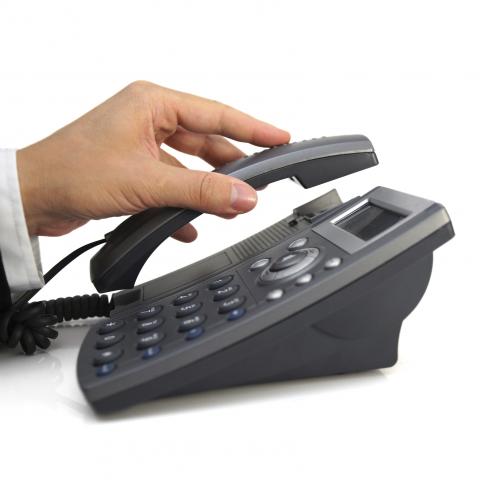
Will you be having a job interview with a Turkish company? Are you getting ready to work in Turkey or travel there for a business trip? If you answered “yes” to one of these questions, then here comes the next question: Do you think you’re ready for the challenge?
If not, don’t panic. Today, we’ll cover some basic business terms in Turkish and common Turkish business phrases. By the end of this article, you’ll be able to greet your colleagues or your future boss, introduce yourself, make travel arrangements, participate in meetings, and take care of correspondence in Turkish.
Let’s get started and make your transition to the Turkish business environment that much smoother!
 Table of Contents
Table of Contents
- Turkish Terms Used in Business
- Greetings and Introductions in Business
- Interacting with Coworkers
- Participating in a Meeting
- Taking Care of Business Communications
- Going on a Business Trip
- Learn More Words, Terms, and Phrases with TurkishClass101
1. Turkish Terms Used in Business
First, let’s cover the very basics:
- İş (“Business”)
- İş adamı (“Businessman”)
- İş kadını (“Businesswoman”)
From this point on, we’ll classify the basic business terms in Turkish based on category so that you can remember them easily.
Company-related words
Here are some useful terms you can use when talking about a company:
| Turkish | English |
| Şirket | Company |
| Kuruluş | Enterprise |
| Kurum | Corporation |
| Firma | Firm |
| Hissedar | Shareholder |
| Küçük ve orta ölçekli işletme | Small- or medium-sized business |
| Kâr amacı gütmeyen kuruluş | Non-profit organization |
| Anonim şirket | Joint-stock company |
| Çok uluslu şirket | Multi-national company |
| Uluslararası şirket | International company |
| Kurumsal firma | Corporate firm |
| Perakende | Retail |
| Toptan | Wholesale |
| Ana merkez | Headquarter |
| Şube | Branch |
| Yan kuruluş | Subsidiary |
| Bayi | Dealer |
| Ofis | Office |
| Büro | Office / Bureau |
| Departman | Department |
You may also find our vocabulary list of Words and Phrases for HR and the Recruitment Process useful!
Work-related terms
Here are some useful words for talking about jobs and work:
| Turkish | English |
| Çalışmak | To work |
| İş | Business / Work / Job |
| Pozisyon | Position |
| İşveren | Employer |
| Personel | Personnel |
| Çalışan | Employee |
| İşçi | Worker |
| Patron | Boss |
| İş arkadaşı | Colleague |
| Kariyer | Career |
| Yönetim | Management |
| Üst | Superior |
| Müdür | Manager |
| Direktör | Director |
| Alt kademe | Subordinate |
| Staj | Internship / Apprenticeship |
| Stajyer | Intern / Apprentice |
| Sözleşme | Agreement |
| Kontrat | Contract |
| Vardiya | Shift |
| Fazla mesai | Overtime |
Make sure to check out our Workplace vocabulary list to learn even more words along with their pronunciation.
Words about money
Money is a very important instrument in nearly every aspect of life, especially in business. Let’s take a look at money-related terms in Turkish:
| Turkish | English |
| Para | Money |
| Maaş | Salary |
| Ücret | Wage |
| En düşük ücret (Asgari ücret) | Minimum wage |
| Gelir | Income / Revenue |
| Net gelir | Net income / Net revenue |
| Brüt gelir | Gross income / Gross revenue |
| İkramiye | Bonus |
| Kâr | Profit |
| Bordro | Payroll |
| Hisse | Share |
| Vergi | Tax |
| Ön ödeme | Advance payment |
| Banka | Bank |
| Banka hesabı | Bank account |
Want to learn more? Head over to our list of Money-Related Expressions for Everyday Life!
2. Greetings and Introductions in Business
Greetings and introductions are very important in both business and social life. When doing business with Turkish companies, first impressions matter, so you need to have a good and impressive start!
Greetings
When greeting someone, you can use any of the following words, regardless of how formal the situation is.
- Merhaba. (“Hello.”)
- Günaydın. (“Good morning.”)
- İyi günler. (“Good day.”) *
- İyi akşamlar. (“Good evening.”) *
(*): You can also use these to say goodbye in both formal and informal situations.
If the situation is very informal, you can say:
- Selam. (“Hi.”)

To say goodbye in a formal manner, you can use one of these phrases:
- Hoşçakalın. (“Goodbye.”) [Literally: “Stay pleasantly.”]
- Görüşmek üzere. (“See you.”) [Literally: “Hope to see you.”]
To say goodbye to a coworker you’re close with, you can use any of the following words:
- Bay bay. / Bay. (“Bye bye.” / “Bye.”)
- Hoşçakal. (“Goodbye.”) [Literally: “Stay pleasantly.”]
- Görüşürüz. (“See you.”)
You can see our vocabulary lists on Common Ways to Say Hello and the Most Common Ways to Say Goodbye for more info!
Self-introductions
Giving a proper self-introduction is just as important as greeting. Here are some useful phrases you can use to introduce yourself when socializing, networking, or engaging in other business situations.
- Ben Mary. (“I’m Mary.”)
- Benim adım Mary. (“My name is Mary.”)
- Benim ismim Mary. (“My name is Mary.”)
- Otuz yaşındayım. (“I’m thirty years old.”)
- Amerikalıyım ama artık Türkiye’de yaşıyorum. (“I’m American, but I live in Turkey now.”)
- Yale Üniversitesi’nden mezun oldum. (“I have graduated from Yale University.”)
- Ben yeni Satın Alma Müdürüyüm. (“I’m the new Purchasing Manager.”)
Don’t forget to read our article Turkish Greetings: How to Introduce Yourself in Turkish for more-detailed information and more useful phrases.
Job interviews
The job interview is a significant aspect of business life and might even have an impact on your future. It’s relatively easy to fill in a job application, pass a test, and even carry out a conversation over the phone, but what will happen when you’re having a face-to-face job interview in Turkish?
Don’t worry! Below are some examples of questions that may be asked during the interview and some useful business phrases in Turkish one could use to answer them.
1. Bana eğitiminizden bahseder misiniz? (“Can you tell me about your education?”)
- Harvard üniversitesinden mezun oldum. (“I graduated from Harvard University.”)
- Finans okudum. (“I studied finance.”)
- Harvard Üniversitesi’nde işletme yüksek lisansı yaptım. (“I have an MBA degree from Harvard University.”)
2. Daha önce nerelerde çalıştınız? (“Where have you worked before?”)
- 4 yıl Unilever’de muhasebe departmanında çalıştım. (“I have worked at Unilever for four years in the accounting department.”)
- Şu an P&G’de finans müdürü olarak çalışıyorum. (“Currently, I’m working as a financial manager at P&G.”)
3. Kaç dil biliyorsunuz? Bunlar neler? (“How many languages do you speak? What are they?”)
- Ana dilim İngilizce. (“My mother tongue is English.”)
- Almanca biliyorum. (“I know German.”)
- Ve biraz da Türkçe. (“And also a little bit of Turkish.”)
Don’t get discouraged if you don’t understand something. Feel free to ask them to repeat what they said.
- Sorunuzu tekrar edebilir misiniz lütfen? (“Could you please repeat your question?”)
- Pardon anlayamadım. (“Pardon me, I couldn’t understand.”)
3. Interacting with Coworkers
Did you ace your job interview? Congratulations! Now it’s time to meet your new coworkers. Here are some practical Turkish business phrases you can use to communicate with your new work team.
Asking for help
Here are some business Turkish phrases that you can use to get help. Note that when the letters in parentheses are added, the questions become formal.
- Bana yardım edebilir misin(iz) lütfen? / Bana yardımcı olabilir misin(iz) lütfen? (“Can you help me, please?”)
- Bunu bana anlatabilir misin(iz) lütfen? (“Can you explain this to me, please?”)
- Bu sistemi nasıl kullanacağımı gösterebilir misin(iz)? (“Can you show me how to use this system, please?”)
- Bahsettiğin(iz) dokümana nasıl ulaşabilirim? (“How can I access the document you mentioned?”)
- Bilgisayarın şifresini verebilir misin(iz)? (“Can you give the password of the computer?”)
Showing appreciation
No matter where you are in the organizational hierarchy, showing appreciation toward your colleagues and subordinates is an important element of motivation.
- Tebrikler! / Tebrik ederim! (“Congratulations!”)
- Katkılarınız için teşekkürler. (“Thanks for your contribution.”)
- Bu büyük bir başarı. (“This is a great success.”)
- Başarılarınızın devamını dilerim. (“I wish you continued success.”)
- İyi iş çıkardınız! (“Good job!”)
Expressing concerns
Of course, things in the garden aren’t always rosy! There will be times when you’ll have concerns you want to express. Here are some Turkish phrases for business to give you a voice in the matter:
- Ben bunu anlamadım. (“I didn’t understand this.”)
- Bana bu konuda bir bilgi verilmedi. (“I wasn’t informed about this.”)
- Bana bu konuda bir eğitim verilmedi. (“I wasn’t trained on this topic.”)
- Bunun için bütçemiz yok. (“We don’t have a budget for this.”)
- Bu kadar zamanda bu işi yetiştiremeyiz. (“We can’t get this job done within this time frame.”)
- Bu dokümanda bir hata var. (“There is an error in this document.”)
- Bununla ilgili bir veri yok. (“There is no data related to this.”)
- Bu toplantıyı ertelemeliyiz/öne çekmeliyiz. (“We must postpone/bring forward this meeting.”)

There are also a couple of idioms that you can use. Be careful not to sound like you’re complaining, though!
- İşim başımdan aşkın. (“I’m overly busy.”)
- Başımı kaşıyacak vaktim yok. (“I don’t have time to catch my breath.”)
You can find more Essential Idioms to Make You Sound Like a Native Speaker on our website!
Making apologies
Everyone makes mistakes, and the best way to stay on good terms with your colleagues or boss is to offer the proper apology. Here are some phrases you can use to do so:
- Özür dilerim, fevri davrandım. (“I apologize, I acted impulsively.”)
- Üzgünüm. (“I’m sorry.”)
- Yardımcı olamadığım için üzgünüm. (“I’m sorry, I couldn’t help.”)
- Bugün olanlar için üzgünüm. (“I’m sorry for what happened today.”)
If you want to learn more apology phrases, read our blog post on How to Say Sorry in Turkish.
Making plans for after-work social activities
If you want to ask your colleagues to go out after work, you can use any of the phrases below. Note that when the letters in parentheses are added, the questions become formal.
- İş çıkışı bir bira içmeye gidelim mi? (“Shall we go for a beer after work?”)
- Mesai sonrası bize katılmak ister misin(iz)? (“Would you like to join us after work?”)
Here are some questions you can ask to get to know your colleagues better during after-work activities:
- Hangi departmanda çalışıyorsun(uz)? (“Which department are you working in?”)
- Hangi proje üzerinde çalışıyorsun(uz)? (“Which project are you working on?”)
- Kaç yıldır burada çalışıyorsun(uz)? (“How many years have you been working here?”)
Make sure you check out our list of the Top 15 Questions You Should Know for Conversations to get more ideas!
4. Participating in a Meeting
Meetings are an indispensable aspect of business life. Let’s review some practical Turkish phrases for business meetings!
- Toplantı (“Meeting”)
- Toplantı ne zaman? (“When is the meeting?”)
- Toplantı nerede? (“Where is the meeting?”)
- Toplantı hangi odada? (“In which room is the meeting?”)
- Toplantı ne kadar sürer? (“How long will the meeting take?”)
- Herkes buradaysa, toplantıya başlayalım. (“If everyone is here, let’s start the meeting.”)
- Başka fikri olan var mı? (“Does anybody have any other ideas?”)
- Size katılıyorum. (“I agree with you.”)
- Ne yazık ki size katılmıyorum. (“Unfortunately, I don’t agree with you.”)
- Herhangi bir önerisi olan var mı? (“Does anybody have any suggestions?”)
- Sanırım bir sonraki konuya geçebiliriz. (“I think we can move on to the next topic.”)
- Çok verimli bir toplantı oldu. (“It was a very productive meeting.”)

5. Taking Care of Business Communications
Communication is an essential element of business. In this section, we’ll look at phrases you can use in Turkish business emails and over the phone.
Emails or letters
Nowadays, electronic correspondence is often used in place of traditional business letters. However, there are still situations where letters are sent out to public authorities or other businesses.
Anyhow, whether you’re writing a Turkish business letter or an email, there will be a:
Salutation Sentence
- Sayın Yetkili (“To whom it may concern”)
- Sayın Pam Carlton (“Dear Pam Carlton”)
- P&G Satın Alma Müdürlüğü’ne (“To the Purchasing Manager of P&G”)
- Merhaba Mehmet Bey (“Hello, Mr. Mehmet”) *
- Bay Johnson merhaba (“Hello, Mr. Johnson”) **
(*) This is mostly used in email. Note that Mehmet is the person’s first name.
(**) This is mostly used in email. This time, the person’s last name is used.
Body and Conclusion of the Email
- Parting words
- Name, last name, and signature
- ❖ Saygılarımla (“Sincerely yours”)
❖ Sevgiler (“Sincere/warm regards”)
❖ Selamlar (“Greetings” / “We salute you”) **
(*) This is informal.
(**) This is neither formal nor informal. It’s somewhere in-between.
Business calls
While audio conference tools are very popular these days, phone calls are still an active part of worklife in Turkey.
Alo (“Hello”) is the most popular way to answer the phone in Turkish. You can use it when talking to your colleagues, but a receptionist wouldn’t normally answer the phone that way. In Turkey, business receptionists would probably start by saying the company name, and then ask:
- Size nasıl yardımcı olabilirim? (“How may I help you?”)
Here’s a possible answer:
- Mehmet bey ile görüşmek istiyorum. (“I want to talk to Mr. Mehmet.”)
Or:
- Beni muhasebe departmanına bağlayabilir misiniz? (“Can you connect me to the accounting department?”)

Here are a few more Turkish business phrases a receptionist might use:
- Hatta kalın lütfen. (“Please stay on the line.”)
- Sizi bir dakika bekleteceğim. (“I will have you wait for a minute.”)
- Mehmet Bey’in hattı meşgul. (“Mr. Mehmet’s line is busy.”)
- Mehmet Bey şu anda toplantıda. (“Mr. Mehmet is in a meeting now.”)
- Herhangi bir mesajınız var mı? (“Do you have any messages?”)
- Daha sonra tekrar arayabilir misiniz? (“Can you call again later?”)
- Notunuzu ileteceğim. (“I will forward your note.”)
Want to be prepared for your next Turkish phone call? Check out our list of Useful Phrases for a Phone Call to learn more phrases and hear their pronunciation.
6. Going on a Business Trip
Here are a few phrases you can use when buying a ticket or checking in at a hotel:
- Merhaba. 23 Nisan için İstanbul’a bir uçak bileti istiyorum. (“Hello. I want a flight ticket to Istanbul for April 23.”)
- Cam kenarında bir koltuk istiyorum. (“I want a seat by the window.”)
- Tek kişilik bir oda istiyorum. (“I want a single room.”)
- Akşam yemeği saat kaçta? (“What time is dinner?”)

Prepare for your travels well in advance with our list of the Top 30 Travel Phrases You Should Know!
7. Learn More Words, Terms, and Phrases with TurkishClass101
By now, you’ve learned many Turkish business phrases that you can start practicing today. Do you think you’re ready to participate in a meeting or go through your job interview in Turkish?
If you think you need more practice with Turkish phrases for business, visit TurkishClass101.com! We provide numerous audio recordings, tons of vocabulary lists, and free resources (including our Turkish-English dictionary), all of which you can refer to for detailed information about the Turkish language and culture.
Note that we also provide the Premium PLUS service MyTeacher, which allows you to practice with a private tutor. If you’re busy or prefer learning on your own time, you can download the app for free and use it wherever you are.
Happy Turkish learning, and good luck with your business endeavors!










